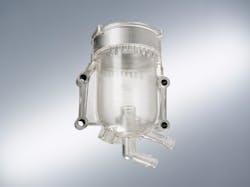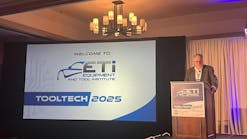Company creates plastic-aluminum hybrid design for highly stressed liquid filter modules
For many years, plastic has proven to be a versatile material for a wide range of applications in commercial vehicles and passenger cars. However, application is limited in the areas of thermally and mechanically highly stressed components, since the relevant plastics achieve only limited strength and stiffness values.
Pressure-loaded liquid filter modules for oil and fuel have been made of plastic for passenger car applications since 2003, when Mann+Hummel put the first plastic oil module into series production. Filter modules made of aluminium are still used in commercial vehicles because of the significantly higher loads they are subjected to. The higher component weight due to the size of the unit and the longer service life have so far prevented the use of all-plastic modules. In order to meet this challenge, Mann+Hummel has developed a plastic-aluminium hybrid design for use in highly stressed applications. This approach makes it possible to give the versatile material plastic the necessary robustness for these challenging applications and to expand its range of applications.
Plastic-aluminium hybrid design and construction
By using different materials or functions, hybrid systems basically have the task of generating a new product which, in its overall properties, is superior to the properties of the individual components. In this case, the combination of a metallic component with plastic creates a system that exceeds the performance of the individual materials.
Aluminium has been established as material for commercial vehicle liquid filter modules for years. It has the necessary mechanical strength and temperature resistance to withstand the life cycle of a commercial vehicle without any problems. As a die-cast component, it is also flexible in its shaping options. Even complex geometries can be reproduced with multi-part tools. In order to complete a functional liquid filter module, further exciting machining steps are necessary on the die-cast raw part, e.g. to incorporate sealing surfaces or threads. In injection molding, on the other hand, threads, sealing surfaces or hydraulic connections can be integrated directly into the molding process without the need for further processing steps. The elimination of machining reduces the effort required to clean the filter housings in order to achieve the required component cleanliness of the module.
In order to combine the advantages of both materials, Mann+Hummel has developed a technology that combines the mechanical strength of metal with the flexible design capability of plastic. A skeleton made of aluminium ensures the necessary stability at highly stressed points. This aluminium skeleton is then sheathed in a plastic functional sheath in which all liquid-carrying elements are arranged.
"We are always working to inspire our customers with cost-efficient and innovative solutions," says Pius Trautmann, head of heavy duty and industrial liquid filter systems.
The example of a transparent fuel filter module (see photo) shows how such a component is constructed. All highly stressed areas such as flange screw connections or cover threads are reinforced with the aluminum skeleton and thus maintain the strength and resilience of the metallic material. The aluminium absorbs the large local mechanical forces and distributes them. The plastic component encloses the metal as a shell and contains the filter element and the liquid guide. The connecting elements for the fuel inlet and outlet are molded directly from plastic.
The design of a hybrid module requires intensive cooperation between design and production, since only close coordination can produce a component that can also be manufactured reliably as a hybrid module. Mann+Hummel says it has many years of experience and competence in the design and manufacture of complex, highly stressed plastic components that make such a concept possible.

